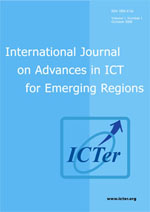Towards an ICT4D Evaluation model based on the Capability Approach
Main Article Content
Abstract
Undoubtedly Information and communication Technologies (ICT) contribute to development; however there is need to know how and the extent to which development occurs. Moreover the evaluation of the ICT contribution to development has been challenged by theoretical, ethical and methodological issues. This paper addresses some of these challenges by proposing a model that enables systematic evaluation of the ICT contribution to development. The proposed model is conceptually motivated by the capability approach that defines development as freedom. Development is a process that involves the provision of opportunities (capabilities) from an ICT resource, as well as actually exploiting the opportunities to realize development outcomes. The conversion of resources to opportunities and opportunities to development outcomes is facilitated or inhibited by various contextual factors. Development from the capability perspective is both people-centered and multidimensional. This requires considerations of both instrumental effectiveness and intrinsic importance. Consequently five evaluation dimensions in which social and economic development are proposed; i.e. education, health, economic facilities, political freedoms and psychological wellbeing. ICT4D evaluation indicators are suggested for each dimension and a Multi-criteria decision analysis (MCDA) structured evaluation process is proposed to guide the evaluation. The application of structured evaluation approach is illustrated through the evaluation of an online learning environment at a University in a developing country. Future research seeks to further apply and validate the model in practice.
Article Details
Issue
Select the Journal Issue
Articles
